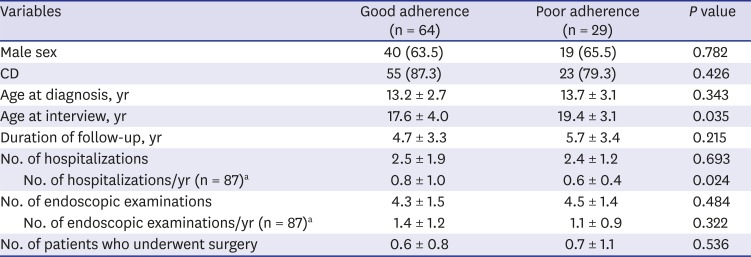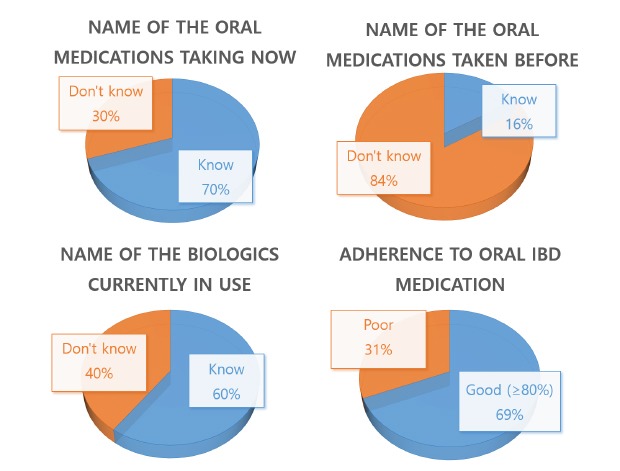1. Podolsky DK. Inflammatory bowel disease. N Engl J Med. 2002; 347(6):417–429. PMID:
12167685.

2. Lee HA, Suk JY, Choi SY, Kim ER, Kim YH, Lee CK, et al. Characteristics of pediatric inflammatory bowel disease in Korea: comparison with EUROKIDS data. Gut Liver. 2015; 9(6):756–760. PMID:
25963086.

3. Yang SK, Yun S, Kim JH, Park JY, Kim HY, Kim YH, et al. Epidemiology of inflammatory bowel disease in the Songpa-Kangdong district, Seoul, Korea, 1986–2005: a KASID study. Inflamm Bowel Dis. 2008; 14(4):542–549. PMID:
17941073.

4. Spekhorst LM, Hummel TZ, Benninga MA, van Rheenen PF, Kindermann A. Adherence to oral maintenance treatment in adolescents with inflammatory bowel disease. J Pediatr Gastroenterol Nutr. 2016; 62(2):264–270. PMID:
26230905.

5. Moradkhani A, Kerwin L, Dudley-Brown S, Tabibian JH. Disease-specific knowledge, coping, and adherence in patients with inflammatory bowel disease. Dig Dis Sci. 2011; 56(10):2972–2977. PMID:
21538016.

6. Kane SV. Systematic review: adherence issues in the treatment of ulcerative colitis. Aliment Pharmacol Ther. 2006; 23(5):577–585. PMID:
16480396.

7. Hawthorne AB, Rubin G, Ghosh S. Review article: medication non-adherence in ulcerative colitis--strategies to improve adherence with mesalazine and other maintenance therapies. Aliment Pharmacol Ther. 2008; 27(12):1157–1166. PMID:
18384664.
8. Sood A, Midha V, Sood N, Kaushal V. Self-reported disease awareness--a questionnaire survey of ulcerative colitis patients. Indian J Gastroenterol. 2001; 20(1):6–8. PMID:
11206883.
9. Baldassano R, Ferry G, Griffiths A, Mack D, Markowitz J, Winter H. Transition of the patient with inflammatory bowel disease from pediatric to adult care: recommendations of the North American Society for Pediatric Gastroenterology, Hepatology and Nutrition. J Pediatr Gastroenterol Nutr. 2002; 34(3):245–248. PMID:
11964946.

10. Tae CH, Jung SA, Moon HS, Seo JA, Song HK, Moon CM, et al. Importance of patients' knowledge of their prescribed medication in improving treatment adherence in inflammatory bowel disease. J Clin Gastroenterol. 2016; 50(2):157–162. PMID:
26501880.

11. Hommel KA, Davis CM, Baldassano RN. Objective versus subjective assessment of oral medication adherence in pediatric inflammatory bowel disease. Inflamm Bowel Dis. 2009; 15(4):589–593. PMID:
18985746.

12. Cervený P, Bortlík M, Kubena A, Vlcek J, Lakatos PL, Lukás M. Nonadherence in inflammatory bowel disease: results of factor analysis. Inflamm Bowel Dis. 2007; 13(10):1244–1249. PMID:
17538983.
13. Jeganathan J, Lee CH, Rahme A, Tiao DK, Weston C, Dutt S, et al. IBD clinical. Medication adherence in transitional inflammatory bowel disease patients: a multi-center pilot study. J Gastroenterol Hepatol. 2014; 29(S2):111.
14. LeLeiko NS, Lobato D, Hagin S, McQuaid E, Seifer R, Kopel SJ, et al. Rates and predictors of oral medication adherence in pediatric patients with IBD. Inflamm Bowel Dis. 2013; 19(4):832–839. PMID:
23446336.

15. Bucci C, Zingone F, Tammaro S, Iovino P, Santonicola A, Ciacci C. Factors predicting the adherence to the therapy of Italian IBD patients. Gastroenterol Res Pract. 2017; 2017:6719345. PMID:
28848602.

16. Lopez A, Billioud V, Peyrin-Biroulet C, Peyrin-Biroulet L. Adherence to anti-TNF therapy in inflammatory bowel diseases: a systematic review. Inflamm Bowel Dis. 2013; 19(7):1528–1533. PMID:
23518810.
17. Campos S, Portela F, Sousa P, Sofia C. Inflammatory bowel disease: adherence to immunomodulators in a biological therapy era. Eur J Gastroenterol Hepatol. 2016; 28(11):1313–1319. PMID:
27501126.
18. Kluthe C, Tsui J, Spady D, Carroll M, Wine E, Huynh HQ. The frequency of clinic visits was not associated with medication adherence or outcome in children with inflammatory bowel diseases. Can J Gastroenterol Hepatol. 2018; 2018:4687041. PMID:
29682493.

19. Franks TJ, Burton DL, Simpson MD. Patient medication knowledge and adherence to asthma pharmacotherapy: a pilot study in rural Australia. Ther Clin Risk Manag. 2005; 1(1):33–38. PMID:
18360541.

20. Tomar SK, Kedia S, Singh N, Upadhyay AD, Kamat N, Bopanna S, et al. Higher education, professional occupation, and upper socioeconomic status are associated with lower adherence to medications in patients with inflammatory bowel disease. JGH Open. 2019; 3(4):302–309. PMID:
31406923.

21. Haaland D, Day AS, Otley A. Development and validation of a pediatric IBD knowledge inventory device: the IBD-KID. J Pediatr Gastroenterol Nutr. 2014; 58(3):313–319. PMID:
24135980.
22. Fishman LN, Houtman D, van Groningen J, Arnold J, Ziniel S. Medication knowledge: an initial step in self-management for youth with inflammatory bowel disease. J Pediatr Gastroenterol Nutr. 2011; 53(6):641–645. PMID:
21681113.
23. Tiao DK, Chan W, Jeganathan J, Chan JT, Perry J, Selinger CP, et al. Inflammatory bowel disease pharmacist adherence counseling improves medication adherence in Crohn's disease and ulcerative colitis. Inflamm Bowel Dis. 2017; 23(8):1257–1261. PMID:
28719539.










 PDF
PDF Citation
Citation Print
Print





 XML Download
XML Download